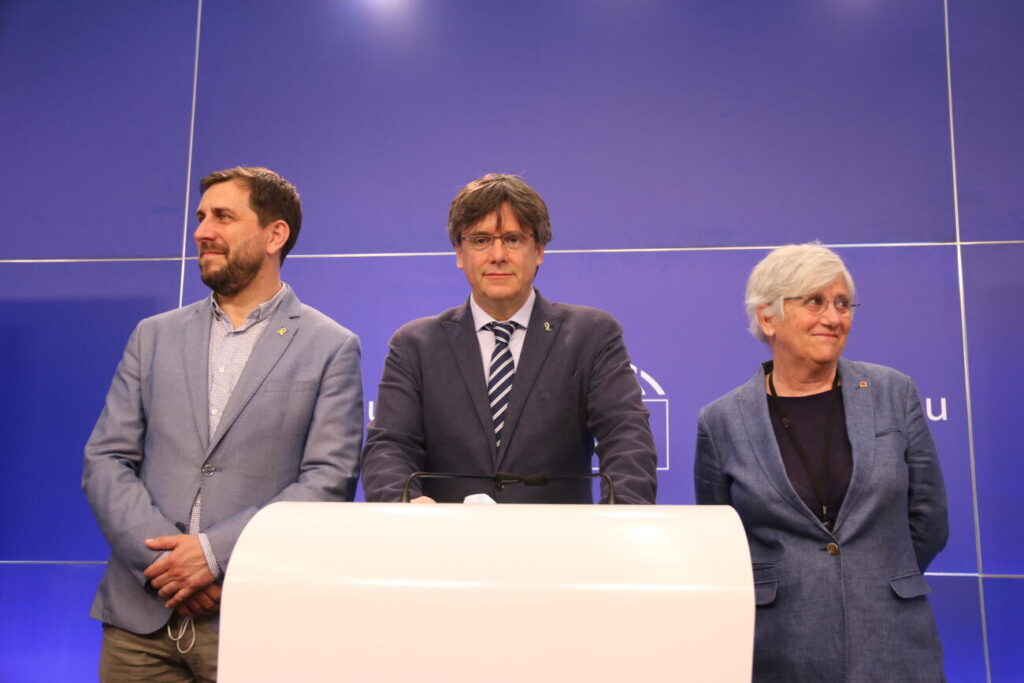03.06.2021 - 11:30
|
Actualització: 03.06.2021 - 13:30
Exiled Catalan president Carles Puigdemont has welcomed the decision of the European General Court to provisionally suspend the removal of his immunity in the European Parliament. In a press conference on Thursday, he said that “it is the first time that the European judiciary restores the immunity of MEPs that the Parliament had decided to lift.” The magistrates’ decision, also affecting exiled former ministers Toni Comín and Clara Ponsatí, is valid while they study their appeals.
The three MEPs called on the EU Parliament not to oppose their restoration of immunity. They consider that tis is precisely the value of the court ruling that was made public on Wednesday: that the European General Court (EGC) granted them precautionary measures without even having received the allegations of the European Parliament. “If we are told that prima facie our arguments seem reasonable, it means that in a first impression the EGC thinks it is a case of political persecution. Or at least they don’t rule out that this is the case”, said Toni Comín.
Puigdemont stressed that “it is an important decision, because it sets a precedent: for the first time the immunity of some MEPs who had been withdrawn is restored.” He recalled that the European Parliament had already deprived them of their rights as MEPs for half a year, and that the European judiciary had to correct it. That’s why he asked them not to make a mistake like that again.
Spain ignores European rulings
Comín insisted: “There was already a wrong decision, which had to be corrected. We can now move freely across the EU except for Spain, which still does not respect our immunity. It is unbelievable that Spain’s Supreme Court to ignores the European judiciary rulings. Europe cannot continue to ignore this problem while pointing to countries such as Hungary, Poland and Slovenia”.
Despite having immunity as MEPs and being able to move freely in all EU countries, the three Catalan MEPs cannot enter Spain because the Supreme Court keeps the arrest warrant against them active. As a result, they have no plans to go back. Clara Ponsatí was clear: “Entering Spain? Right now, the threat of political persecution within Spain has not diminished and it is the EU’s job to enforce European resolutions. So right now we have no plans to do that”.
You can watch the full press conference here:
Divided Parliament
Puigdemont, Ponsatí and Comín, who were elected in the European election as members of the pro-independence Junts per Catalunya party, were stripped of their parliamentary rights last March after a majority of fellow MEPs in the chamber voted in favor of doing so. The three politicians, who left Catalonia for Belgium in the fall of 2017 fearing imprisonment for their role in the independence referendum, challenged the European Parliament decision in the European Court of Justice in Luxembourg.
They denounced a “breach of confidentiality,” since the content of the report prior to the preliminary chamber committee vote on the issue was revealed before MEPs voted on it – the chamber insists that Members of the European Parliament cannot reveal the content of reports before a vote in a committee. The report was drafted by ultra-conservative MEP Angel Dzhambazki and greenlighted by the committee on Legal Affairs, led by a member of the anti-independence Ciudadanos party, Adrián Vázquez, on 23 February.
Thus, Puigdemont took the case to the European General Court, claiming that there had been “formal errors” and also argued that they had been victims of political persecution. In the vote to lift Puigdemont’s immunity in the European Parliament’s plenary session, 400 MEPs sided in favor of doing so, 248 were against it, and 45 representatives abstained.
Failed extradition attempts
The Spanish Supreme Court has repeatedly tried to extradite the three politicians to judge them for over three years, but so far they have failed to do so – their last hurdle was their immunity, which they requested to be lifted but now has been provisionally restored. Their extradition processes will be further delayed again, not only because the EU court has to make a final decision over their immunity – if, in the end, they keep it, Belgian courts will have to stop the judicial procedures to consider whether to hand them in to Spain –, but also because Spain’s Supreme Court submitted a request to the European Court of Justice for a preliminary ruling on the case of Lluís Puig, another exiled leader.
Belgium refused to hand him over on the grounds that the Supreme Court did not have the authority to try him since he no longer had a post in government. They also raised concerns that Puig’s presumption of innocence might be at risk in Spain, following a report by the UN’s Working Group on Arbitrary Detention about the politicians who are now serving a prison sentence rather than being in exile.
Judge Pablo Llarena asked the European Court of Justice whether these arguments could be used against a European arrest warrant. Puigdemont, Comín and Ponsatí’s lawyers believe that the court will take a year to answer, and that in the meantime the extradition requests will remain frozen.


